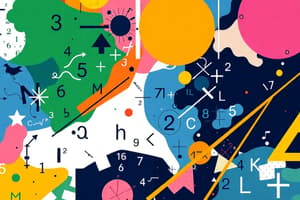Podcast
Questions and Answers
What is a primary focus of arithmetic?
What is a primary focus of arithmetic?
- Graphing equations
- Modeling real-world problems
- Addition, subtraction, multiplication, and division (correct)
- Finding rates of change
Which branch of mathematics is concerned with shapes and sizes in space?
Which branch of mathematics is concerned with shapes and sizes in space?
- Algebra
- Geometry (correct)
- Statistics
- Calculus
What does differential calculus primarily focus on?
What does differential calculus primarily focus on?
- Finding instantaneous rates of change (correct)
- Finding areas under curves
- Solving polynomial equations
- Accumulating quantities over time
What role do variables play in algebra?
What role do variables play in algebra?
Which statistical measure is used to summarize data?
Which statistical measure is used to summarize data?
In algebra, what are systems of equations used for?
In algebra, what are systems of equations used for?
Which of the following is NOT a key component of geometry?
Which of the following is NOT a key component of geometry?
What does integral calculus primarily calculate?
What does integral calculus primarily calculate?
Flashcards
Arithmetic
Arithmetic
The branch of mathematics focused on fundamental operations like addition, subtraction, multiplication, and division.
Algebra
Algebra
Branch of mathematics using variables and equations to solve for unknowns.
Geometry
Geometry
Study of shapes, sizes, and positions of objects in space.
Calculus
Calculus
Signup and view all the flashcards
Statistics
Statistics
Signup and view all the flashcards
Variables
Variables
Signup and view all the flashcards
Derivatives
Derivatives
Signup and view all the flashcards
Integers
Integers
Signup and view all the flashcards
Study Notes
Fundamental Concepts
- Mathematics is a broad field encompassing the study of quantity, structure, space, and change.
- It uses symbolic language to represent abstract concepts, allowing for precise and logical reasoning.
- Key branches include arithmetic, algebra, geometry, calculus, and statistics.
- Mathematics plays a crucial role in various fields like science, engineering, finance, and computer science.
Arithmetic
- Arithmetic focuses on fundamental operations: addition, subtraction, multiplication, and division.
- These operations form the basis for more complex mathematical concepts.
- Integers, fractions, decimals, and other number systems are key components of arithmetic.
- Order of operations (PEMDAS/BODMAS) dictates the sequence for evaluating expressions.
Algebra
- Algebra involves manipulating variables and using equations to solve for unknowns.
- Variables represent unknown quantities in mathematical expressions and equations.
- Solving equations and inequalities are fundamental algebraic skills.
- Algebraic equations and formulas are essential in modeling real-world problems.
- Polynomials and factoring are crucial for algebraic manipulations.
- Systems of equations allow for the solving of multiple unknowns simultaneously.
Geometry
- Geometry examines shapes, sizes, and positions of objects in space.
- Concepts like points, lines, angles, triangles, and circles are fundamental in geometry.
- Euclidean geometry, a major type, deals with two-dimensional and three-dimensional shapes.
- Different types of angles (acute, obtuse, right) are identified.
- Area and perimeter calculations are common geometric applications.
Calculus
- Calculus deals with rates of change and accumulation of quantities.
- Differential calculus focuses on finding instantaneous rates of change.
- Derivatives represent the rate of change of a function.
- Integral calculus calculates the accumulation of quantities over a given interval. Integrals represent the accumulation of quantities.
- Applications of calculus include modeling motion, optimization problems, and calculating areas and volumes.
Statistics
- Statistics involves collecting, analyzing, and interpreting numerical data.
- Statistics helps to understand patterns and trends in data.
- Descriptive statistics summarizes data using measures like mean, median, and mode.
- Inferential statistics uses samples to draw conclusions about a larger population.
- Probability is used to quantify uncertainty in statistical analysis.
- Probability models help us predict outcomes in various situations.
- Data visualization tools like graphs and charts enhance the understanding of statistical findings.
Studying That Suits You
Use AI to generate personalized quizzes and flashcards to suit your learning preferences.





